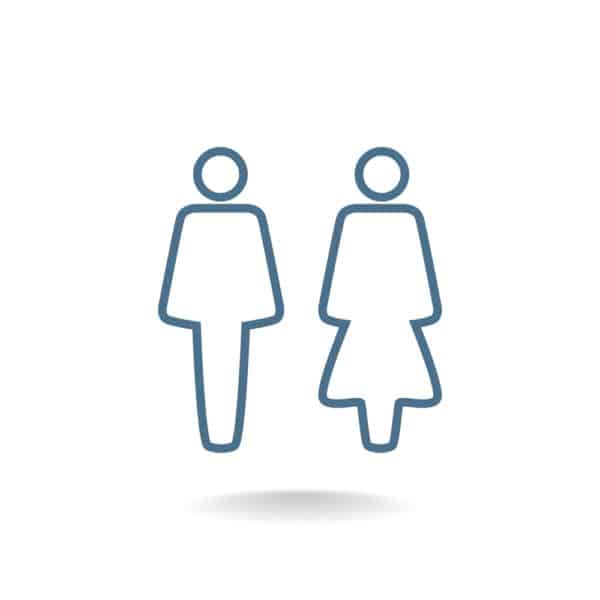While seeking therapy for mental health still has a bit of a general stigma, men seem to feel even more alienated by choice.
The truth is that their feelings hold some merit, but only when considering those judging male clients going to therapy. By helping dispel these negative stereotypes and validating men going to therapy, mental health can be better normalized for another group.
With less stigma, men who need treatment won’t have to worry about being judged by those around them. But what happened to make men less likely to engage in the therapy process? Is there a way to turn things around and support men needing therapy?
Why Men Don’t Go to Therapy
There’s no denying that treatment for mental health issues will differ between men and women. In substance abuse cases, men and women will react differently due to the composition of their brains.
What doesn’t change is how important it is to engage in therapy when a mental illness is present, especially early in life. Unfortunately, many men are still taught at a young age that boys don’t get to have emotions or that they’re not a big deal.
When they hear this from men in their families, the idea is firmly planted and often backed up by other unsupportive members of society. Teenage boys are some of the loudest voices that degrade their peers for being emotionally considerate or admitting they have feelings.
It’s up to parents and schools to change these outdated views, or there’s a risk future generations of men will follow the same stigmas and ignore the opportunity to attend therapy.
Some Men Consider Mental Health Issues Invalid
Because of these preconceived ideas of therapy and masculinity clashing, guys struggle to admit they’re suffering from depression, anxiety or even thoughts of suicide. They may see their problems as made up or trivial, though these conditions are no less natural than anyone else’s suffering.
Most men wait until their family or partner forces them to seek treatment before considering therapy sessions. Men don’t need to wait until they’re broken to work on themselves. Everyone deserves access to the help they need to overcome mental health struggles.

Other Men See Mental Illness and Therapy as a Weakness
The feelings men have toward seeking a therapist for counseling often fall into either uninterested or opposed. Those opposed may see the act as a sign of low masculinity, with more men going without treatment than women.
Men start to fear seeking out a therapist or acknowledging depression, as it could mean being viewed by their peers as lesser in some way. If a man doesn’t consider himself a man, things like depression can worsen.
When families start to show concern for the men in their life, they may meet resistance when suggesting counseling sessions or professional therapists. They may think that by opening up emotionally, they’re going against what it means to be a man. It may take an intervention to deliver an ultimatum before men seek therapy. Even then, they see it as an obligation rather than a tool to better themselves.
Men Suffer From Masculinity and Identity Issues
If you try talking to different people, both men and women, you may find that both sides share the sentiment that men shouldn’t need to talk to a therapist or counselor. This makes it seem that in any relationship a man enters, he has to be the emotional rock and support. The moment he fails, he’s seen as less of a man.
These masculine identities have been around for decades and are only changing for the better in recent years. In recent years As acceptance increases, men will have the mental space to realize the source of their pain enough to know they need professional help.
Counseling psychology is crucial to overall mental health, whether you’re a man or woman. Not having a doctor, therapist or counselor for mental health assistance leads to higher rates of suicide, according to a study by the National Institutes of Health. It’s time to encourage men to seek a therapist to support their emotional well-being.
They Want to Improve Their Personal and Work Relationships
When you’re doing everything you’re meant to do in life and something still doesn’t quite feel right, it’s important to talk to someone. The connection men find with their therapists is often the first time they can openly discuss their emotions and their daily suffering.
For some, past trauma has left various fears, and anxieties behind that require the work of a clinical psychologist to uncover and help patients work through. Tackling these mental health problems is best done through psychotherapy, which simply means talking out issues in various ways.
As men learn to embrace this vulnerability and continue to seek help, they’ll find it easier to connect to others on an emotional level. Every new information they obtain about positive coping mechanisms and setting relationship boundaries is used to strengthen old and new bonds.
Gender Roles: Why Therapy Makes Sense
The American Psychological Association has a set of guidelines for the psychological treatment of boys and men. In this, they go in-depth on the social constructs of male gender roles and masculinity.
One element of this construct is that men are meant to be the strong and unshakable part of a relationship, with no possibility of deviating from this behavior. They attempt to hide and mask the symptoms and pain to carry on as men have said they’re supposed to.
There’s a silver lining in all of this, though. The number of men who seek out mental health treatment has been steadily increasing every year, giving many men hope that their mental health will no longer be seen as a weakness.

Is Therapy Effective for Men? Yes, and Alta Loma Is the Key
Alta Loma understands the unique difficulty men have when they seek therapy. We aim to make therapy accessible to men as they begin down their road of growth and healing.
Our team is focused on helping you overcome what plagues your mind so you can be the person you want to be. A mental health professional individualizes every treatment program to address your exact needs.
If you have any questions about our facilities or programs or need help determining if your insurance company covers care, please don’t hesitate to contact us at 866-457-3843.



